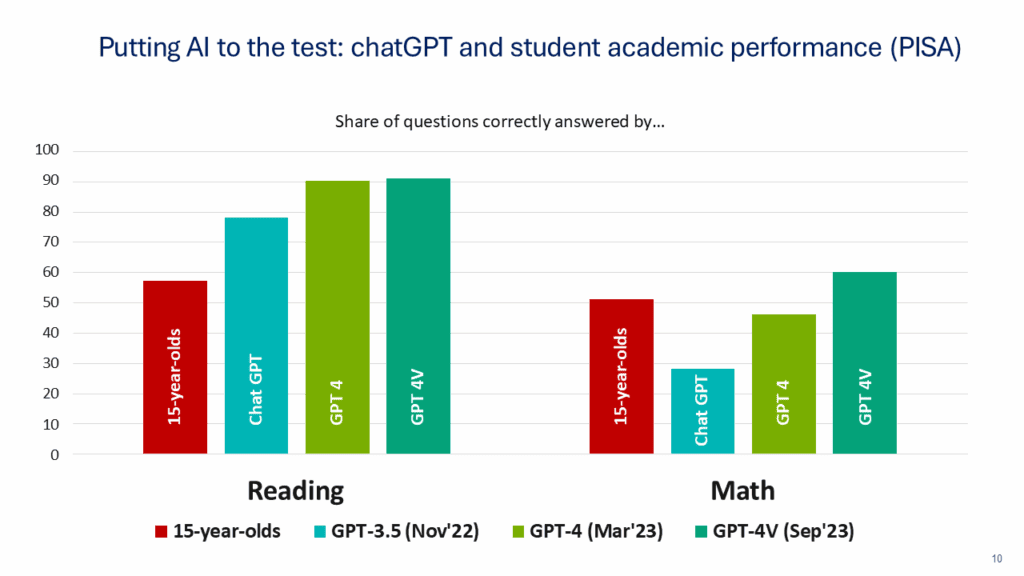AI and Education: Do We Still Need Live Teachers?
In this Article
Rethinking School in the Age of AI and Education
IPA was invited to contribute to the Intelligent Robotics Fair, Conference and Family Day organised by our DRONE partner Eötvös Lórand University on 24–26 June. Our Director was invited to give a keynote with the title Do we still need live teachers in the age of AI and robots? and also to participate at a roundtable on the Family Day.
In her keynote, she reflected on the fact that the world was facing a global learning crisis (World Bank 2018) even before the school closures of 2020–22 that has a number of not surprising, but shocking characteristics. It is not only about children with no access to school anymore, but about those who do attend formal education, even receive some kind of school leaving certification, but do not acquire basic literacy and numeracy skills, not to mention other skills necessary for the 21st century.
She has highlighted that research and experience shows that school has little to do with real life which is a multifaceted phenomenon. First of all, school curricula are often overcrowded with skills and academic content that are outdated and without consensus on why they are necessary to teach and learn (see the saber-toothed tiger parable).
School is also often sheltered from the outside world meaning that it provides little support and skills development in the field of everyday life situations – present and future – especially for those whose parents are less able to provide such necessary education at home struggling with aspects of everyday life themselves. This has been made worse by more and more school systems trying to ban the most widely accessible digital tool, the mobile phone. At the same time, a concerningly high percentage of families are fully opting out of the formal education system. There is a need for change. In many of these debates, AI and education emerge as interlinked challenges that require careful, evidence-based responses.
Family Perspectives and System Reform
Parents International, as an independent research organisation, has explored and mapped beliefs about education in the process of determining what needs to change in a system. Mapping beliefs and making families’ contributions to education systems visible is one of the threads throughout the research we have done in multiple projects in the past 3–4 years. We have extensively researched the situation in Hungary and the Netherlands.
This keynote introduced our results exploring how school systems should become more adjusted to the needs of children of today and the world of tomorrow primarily based on data collected in the DRONE and EFFEct projects. We have also explored how the contribution of companies can be evaluated against SDG4 and how collaboration between companies and schools can become more organic to ensure that modern technology is present in schools alongside teachers. The growing presence of AI and education in classrooms must be addressed in ways that respect children’s rights, promote access, and support inclusion.
Trust, Technology, and the Role of Families

In the roundtable discussion, moderated by our DRONE colleague Márta Turcsányi-Szabó, speakers coming from academia, government and stakeholder representation had an interesting discussion on questions many parents raise in relation to AI. We have discussed if there is a real need to be afraid of overusing AI and what families can do to have a balanced approach.
There were no revolutionary solutions recommended: parents (and hopefully at a certain point also teachers) as role models and the importance of families having varied activities, including offline ones that are engaging for children were mentioned. Very much related to our work in DRONE and the data collected in EFFEct, we have tackled the issue of deepfakes and manipulated content, and participants agreed that in general children are better at identifying them than adults, and that it should be a mutual learning process. These conversations reflect broader concerns about AI and education, particularly how to build digital literacy without compromising creativity and emotional well-being.

We were asked about the one thing parents should tell children about AI by the time they are 12, and our contribution was to make them aware that AI only “knows” and can build on information humans allow it to access, so if information is not correct or biased it might be the result of not accessing the relevant information. AI and education must both be approached critically, as systems that reflect the choices and biases of the people behind them.
Finally, we were asked what use or feature of AI makes us hopeful. In our input, we have highlighted that the universal translator from Star Trek is very close to becoming available, removing one of the biggest barrier of understanding each other. It’s one of many signs that AI and education, when used wisely, can support not just learning, but human connection across languages and cultures.
More from Parents International
Parents at the Heart of AI-Ready Digital Citizenship